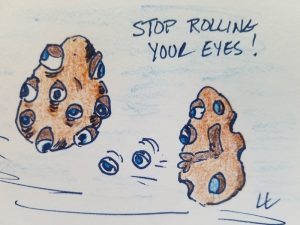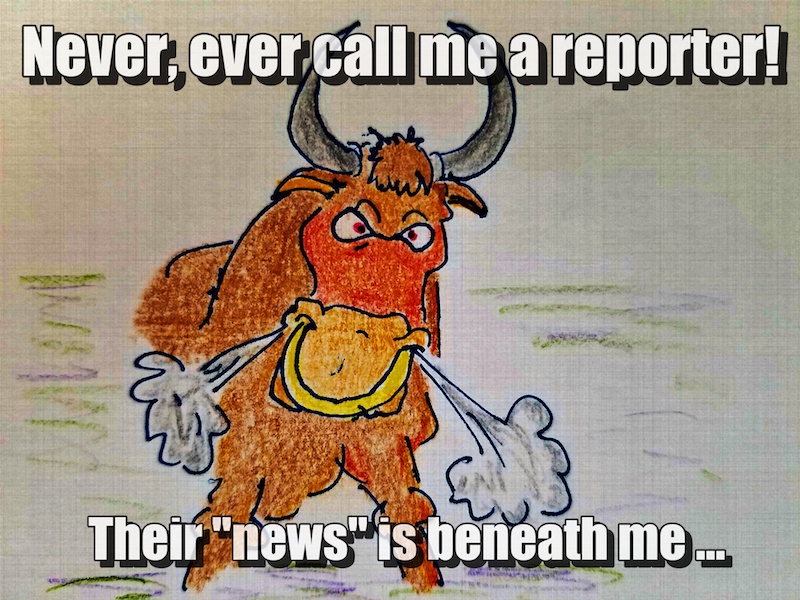Here are just a few of the odd things that occurred during the past 15 years of the WPA.
14. Semi-Nude Presenter – Sometimes, we have someone famous announce the winner of the annual Golden Donut Short Story Contest, and they typically do so via video. One year the winner’s name was announced by actor Michael Cudlitz of Band of Brothers, SouthLand, The Walking Dead, and currently Superman and Lois (Cudlitz plays Lex Luthor).
Mike was a bit late in getting the recorded video announcement to me, arriving the day we were due to present the trophy. He followed up by calling to apologize for the tardiness. The delay, he said, was because he’d been filming the TV show SouthLand and the video had slipped his mind.
He went on to say that he’d remembered it after he’d gone to bed the night before and was nearly asleep when it hit him. So, he immediately hopped out of bed, slipped on a t-shirt, and then recorded the brief video, a clip that showed Mike from the waist up. He said the upper body shot was appropriate and 100% necessary since in his haste to make the recording he’d neglected to put on pants; therefore, he was nude from the waist down.
So yes, Michael Cudlitz announced the winner of the WPA Golden Donut Contest while NOT wearing pants. Of course, fans of the TV show SouthLand once saw Mike’s lower half (back side only) during a shower scene.
13. Topless Car Wash – In 2009, the WPA took place at a public safety academy in Jamestown, N.C., and we booked a nearby hotel for sleeping and meeting rooms, and the banquet and reception. Unfortunately, we did not check out the businesses located to the rear of the property. As a result of our poor observation skills, the view many of our attendees were treated to when gazing out from their hotel room windows was that of a quite busy topless car wash. We’ve not made this mistake a second time.
12. Love Story – Two writers met and fell in love at the WPA and later married.
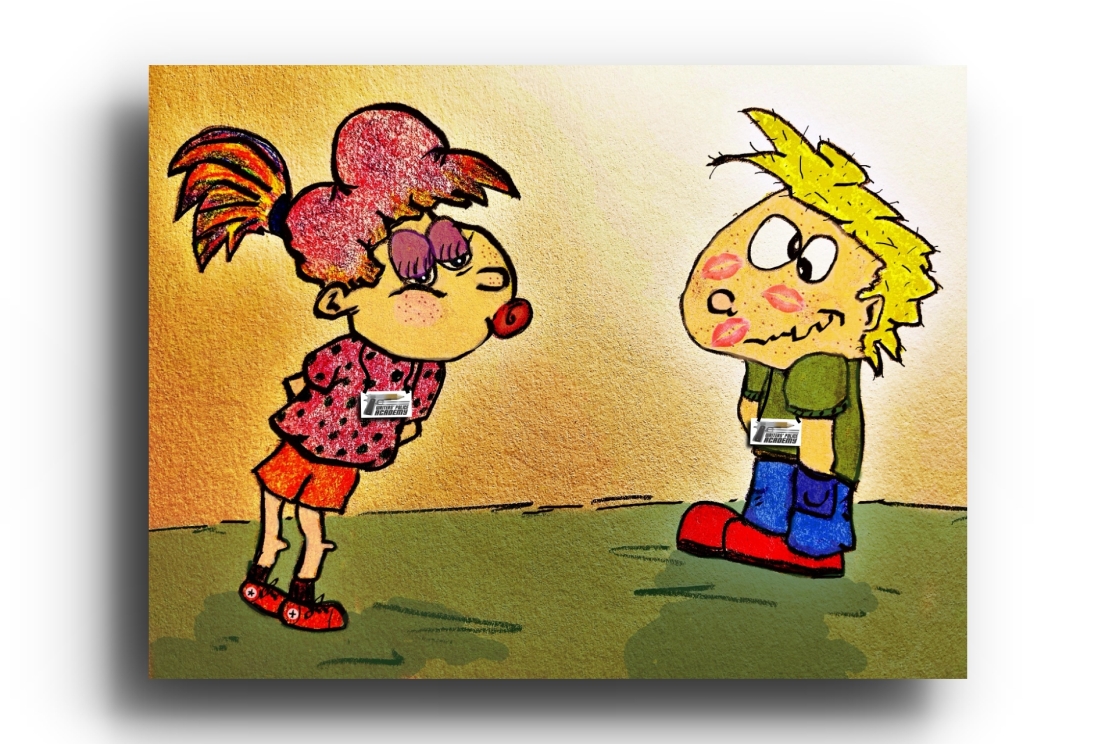
11. Love Story, Part II– Two newlywed writers, not the two from #12, spent their honeymoon at the Writers’ Police Academy.
10. Writers Destroy Equipment – During PIT Maneuver training (Precision Immobilization Technique), a writer/driver connected the right front corner of their patrol vehicle with the left rear of the suspect vehicle’s left rear corner. Well, the object of the technique is to cause the suspect vehicle’s rear tires to lose traction and spin to bring the car to a stop, allowing pursuing officers to apprehend the driver. In this session, however, the writer/driver engaged with a wee bit too much force and ripped off the entire front bumper of their patrol car. During the Saturday night banquet, the instructor presented the mangled bumper to the attendee as an “award” for their remarkable driving skills. PIT Maneuver classes are no longer offered at the WPA. Gee, I wonder why not …
In another accidental incident, a WPA attendee was a little too rough when behind the wheel of the emergency vehicle driving simulator, and, well, they broke it. The initial cost of the simulator exceeded $100,000.
9. No Bra, Do NOT Go to Jail – In past years, we offered tours of county jails, prisons, police departments, and morgues. Since jail and prison tours involved visiting actual housing units where inmates live and were present, WPA attendees were searched before entering the facility. They were not allowed to wear jewelry, carry purses, bags, cellphones or cameras, ink pens, or weapons (of course), and they were to be properly attired—no revealing clothing.
Well, one of the attendees scheduled for the tour was someone whose personal preference was to not wear a chest area undergarment, and the person’s wardrobe selections as upper body wear for the event included only thin shirts/tops. They were refused entry to the jail unless a proper change of clothing was immediately available. So, one of our volunteers managed to produce a bra and shirt, both correctly sized, and all was made well in a matter of minutes. Those volunteers—the “Library Ladies” —were prepared for practically anything that popped up or out or that needed covering.
8. NO FOOD! – We sometimes host a nice Friday night reception that takes place around 7 p.m., complete with delicious hors d’oeuvres and beverages.
Back in the day I typically did not micromanage the reception setups and preparation, as I do for the law enforcement-related activities. After all, what could go wrong with fruit, cheese, and meatballs? You set up a bunch of tables, prepare the food, and then place it on the tables for people to enjoy. That’s it, right?
One would think so, but …
I usually arrive at the reception between 6 and 6:30 to make sure the cash bar and food are in place and that our guests are having a good time. Well, this particular year when I arrived the food was nowhere to be seen. Nor were the tables where the goodies were to be placed. I immediately strolled into the kitchen, a place where no mortal human is supposed to go, to see about the trouble. I saw nothing but empty food prep tables and stovetops. No employees, No chef. Not even a single crumb for a hungry mouse to find for its midnight snack.
I panicked.
I found one of the event set-up people in the back office and explained the situation, quite loudly. He said there were no orders for a reception. Again, I raucously explained the situation. He finally found our reception order on a clipboard and was shocked to see the extensive food list. It was now 6:10 with the reception scheduled to begin at 7. He said there was nothing he could do because there was no food to prepare.
As you know, I would never settle for such an answer. Therefore, I INSISTED that he call someone who could help, and then together he and I went to work. I discovered an entire already-prepared wedding reception feast just sitting in the walk-in cooler waiting for the taking. So, I, along with the set-up guy and three other hotel staff who responded to the call for help, heated the things that needed heating, plated things that weren’t already plated, arranged things that needed arranging, and then carried it all out to the tables that were then waiting in the reception room.
We started the reception ten minutes late, but it was done, and it was scrumptious. Best of all, no one had any idea of the chaos that went on behind those kitchen doors.
7. No Instructors, No Problem – Due to outgrowing one of our host academies we moved to a larger training facility. The new venue was relatively nice with top-of-the-line equipment. However, several instructors who worked there failed to show up on the first day of our event. No advance notice. Nothing. Not a peep. They simply didn’t show up, which left us scrambling to accommodate nearly two-hundred writers. We managed to make use of larger classrooms to shift attendees from the suddenly nonexistent sessions to those that were available. Fortunately, it all worked out and appeared seamless.
But the next day promised to be a repeat of AWOL instructors who’d not taken their commitment to the WPA seriously. So, Denene, the hotel security chief (a former instructor at the academy in question), and I were up that night until 3 a.m. trying to come up with a solution for a potential day two disaster. Luckily, with the security boss’ assistance and several late-night phone calls to contacts and friends, we had instructors to fill in the vacant spots.
The event was a success with no one the wiser as to the hours of agony we’d experienced. We did not return to this academy.
6. Food Shortage and Drunk Chef – Our Saturday night banquets are pleasant, fun affairs. The food is typically very good, as is the joy of sharing the meal with friends and fellow attendees who’ve spent the past three days enjoying the excitement that comes with participating in the Writers’ Police Academy. And, well, the banquet is usually a flawless portion of the event. After all, there’s not a lot to it. People come in and sit, talk, and drink while the chef and staff put the final touches on a delicious meal. Simple, right? Sure, it’s easy if the chef prepares ALL the meals for ALL our attendees. But when he forgets to cook 25 or 30 of those meals and then heads out to a local bar for a night of rapid-fire alcohol consumption, well, that’s a recipe for disaster, and that’s exactly what happened one year.
When I saw the banquet manager heading toward our table, with a worried expression plastered on her face, my first thought was, “What fresh hell is this.” I somehow managed to contain the explosion that wanted to erupt from deep down in my core when she leaned down and whispered the news in my ear. “We do not have enough food for everyone, and the chef has gone for the night.”
As luck would have it, though, the member of the banquet staff we’d immediately sent searching for the preparer of our meals found the chef washing down his troubles with booze at a tavern merely a few blocks from the hotel. It was his regular after-work watering hole, so they’d had a good idea of where to start looking. Our “scout” delivered his slightly inebriated boss back to the kitchen where he oversaw the preparation of the missing meals. Somehow, the meals were completed on time and were tasty.
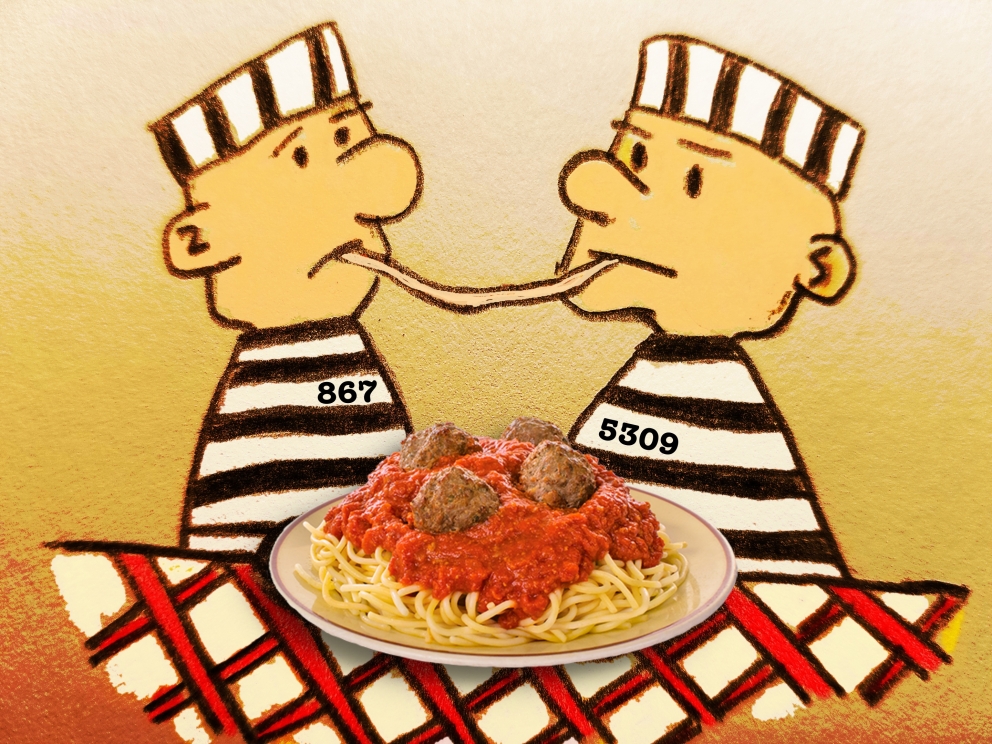
Again, this all took place behind the scenes, so no one knew this happened, other than Denene and me, and the extremely rattled banquet staff.
We no longer use this hotel.
5. An Extension Cord Made of Gold? – The same hotel mentioned above in #6 wanted to charge us a whopping $300 to use an old extension cord. The bookstore folks needed it to power a device. I gently explained that we would not agree to such an exorbitant fee and, after a call to the manager, the cord was handed over to the bookstore, at no charge. Shoot, I bought my first car for only $400.
4. It’s Only Money … a Lot of Money – Back in the early days of the WPA, one of our former hotels had us settle the entire event bill at the front desk when we checked out on Sunday afternoon. Denene and I stood in line with others who were also checking out and when our time came to handle our business the clerk handed me the bill and said, “Your total is xxx.”
The amount that year was just over $30,000. The couple standing behind us heard the total and when they did the woman said to her partner, “Over thirty thousand! Wow, I wonder how long they were here?”
3. HELP ME! – One late night, one of our attendees exited the hotel elevator on the wrong floor, the basement level where staff offices and other private areas are located. Unfortunately for the attendee, during off hours, this floor is supposed to be inaccessible to hotel guests. As a result, the doors there are locked, and the elevator does not work for return trips to upper levels. It was a fluke that the elevator went there at all.
So, the person was trapped in the darkened basement. Luckily, they were able to call for assistance, but not before sending me a frantic “Help! I’m locked in the basement” message.
2. My Horse Won’t Let Me Go to the WPA – During the past 15 years thousands of writers, and others, have attended the Writers’ Police Academy. Each year, some write to say they’d love to come but they’re unable to do so for a variety of reasons—illness, vacation, child’s graduation, etc. Well, I thought I’d heard every possible reason why someone couldn’t attend until this message arrived.
“I can’t make it this year because I need to use the money to buy horse sperm and it’s expensive.”
Breed the horse to bring a little one into the world, or play cops and robbers for a weekend? The choice was, well, good horse sense.
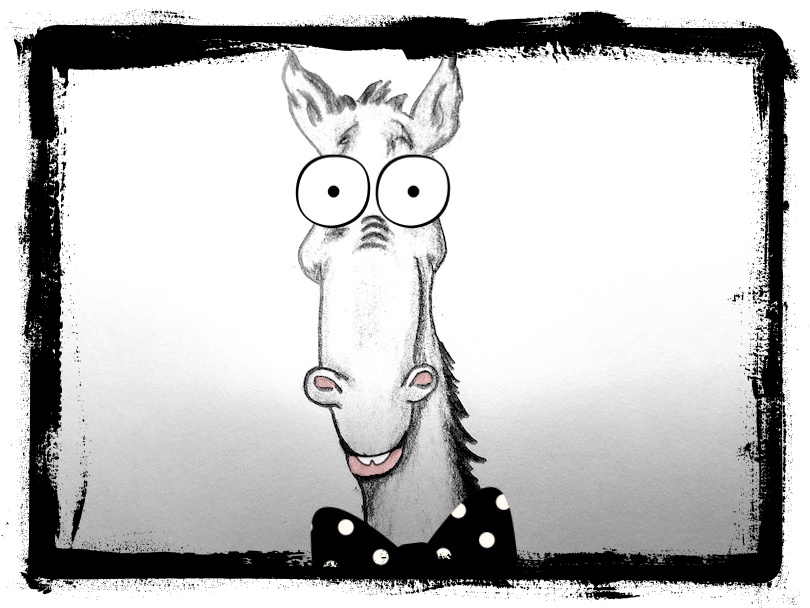
And the Number One Odd But True Thing That Happened at the Writers’ Police Academy is …
1. We LOST Lisa Gardner! – As most of you know, the Writers’ Police Academy has been blessed with having as our guests of honor, some of the biggest names in the business, such as #1 New York Times bestselling thriller novelist Lisa Gardner.
Lisa not only served as the guest of honor, but she also eagerly participated in classes alongside attendees. In addition to the typical sessions, we arranged for Lisa to go on a nighttime ride-a-long in an unmarked car with an officer who was working a special assignment. The officer, a plainclothes deputy sheriff, was supposed to return Lisa to the hotel by 10 p.m. However, 10 p.m. came and went, as did 11 p.m. I tried calling and texting Lisa, but no response.
11:30 … no Lisa.
11:45 … no Lisa.
I contacted the sheriff’s office and was told they were unable to reach the deputy.
I then had to face reality. We had officially lost Lisa Gardner, our guest of honor and one of the world’s top thriller authors. Her fans would be livid.
Shortly after midnight, though, I received a text from Lisa. It read, “Back soon. On a drug raid. Suspects in custody.”
Lisa’s late-night message was the non-writer equivalent of, “Having a great time. Wish you were here!”

Coming in 2024!
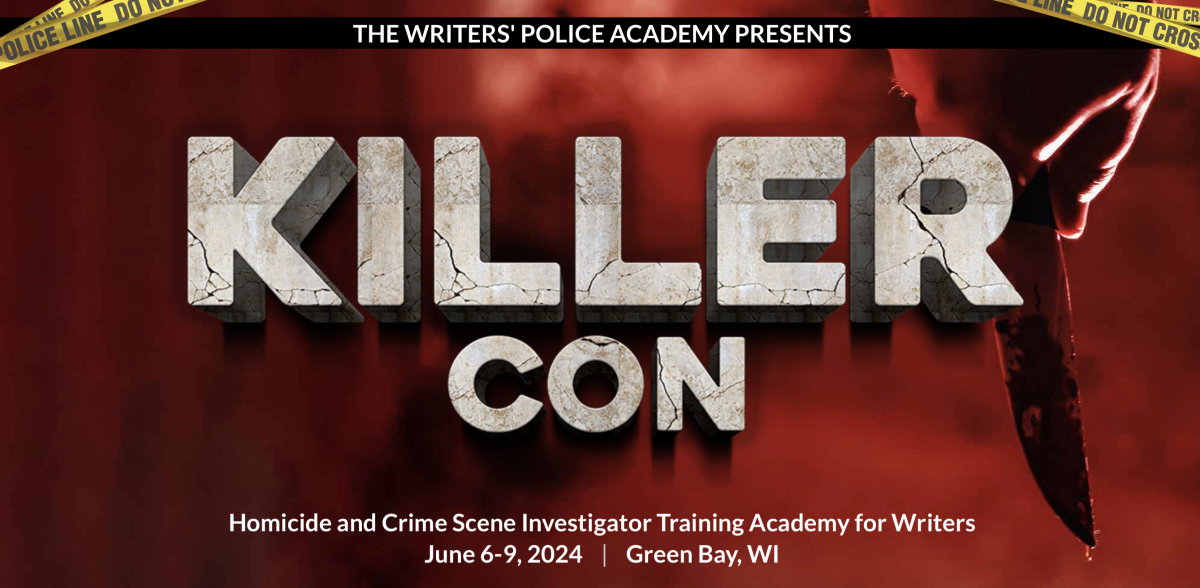

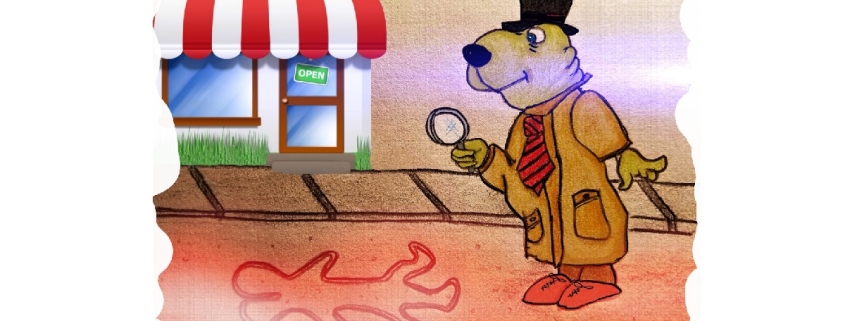
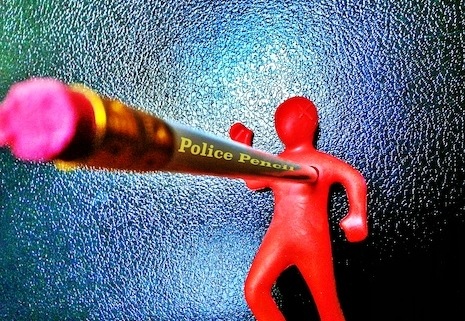
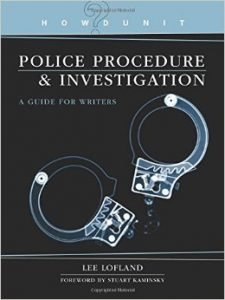

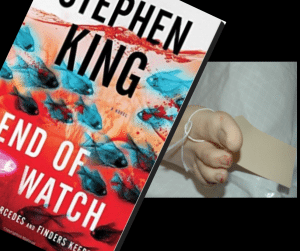



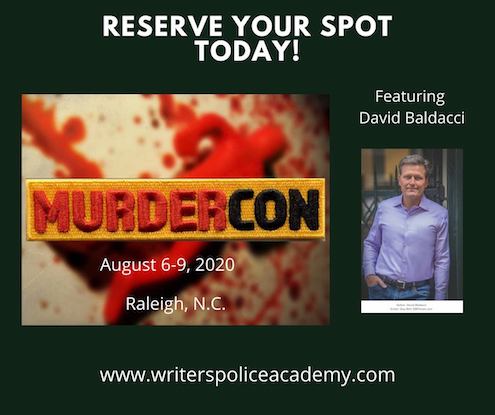
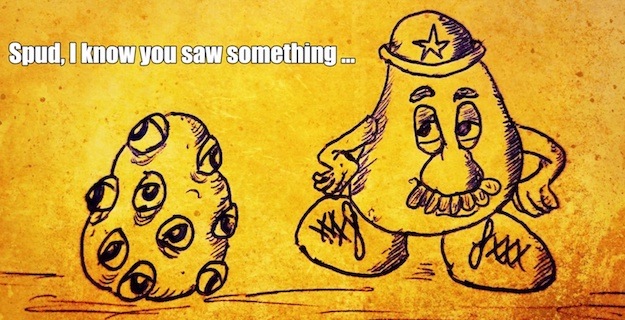
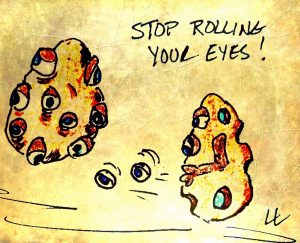


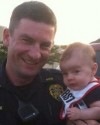 Officer Bradley Fox, 34
Officer Bradley Fox, 34






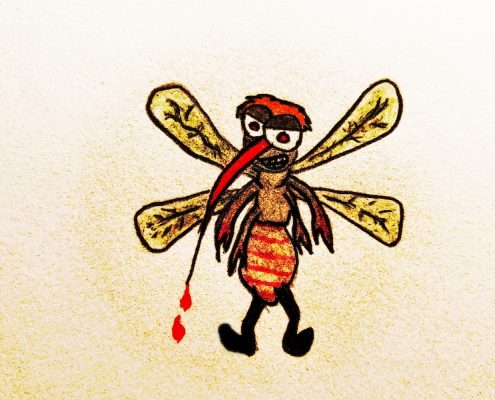


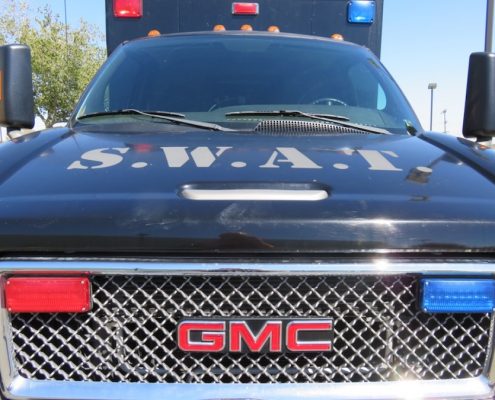
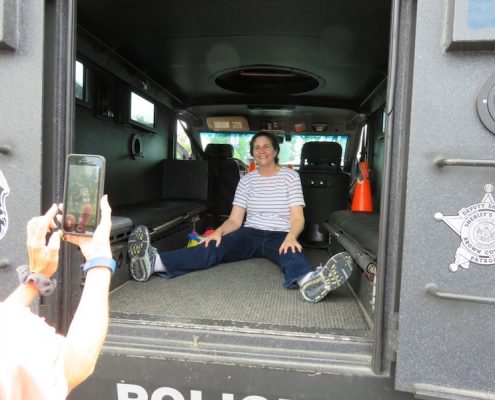
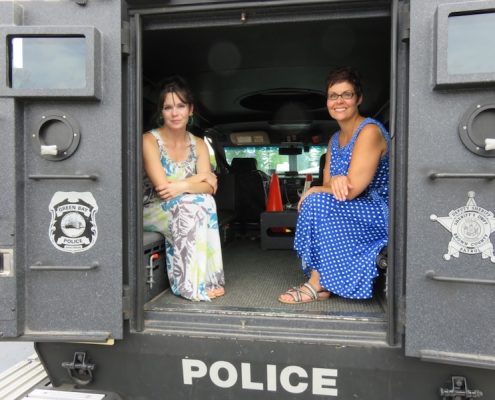
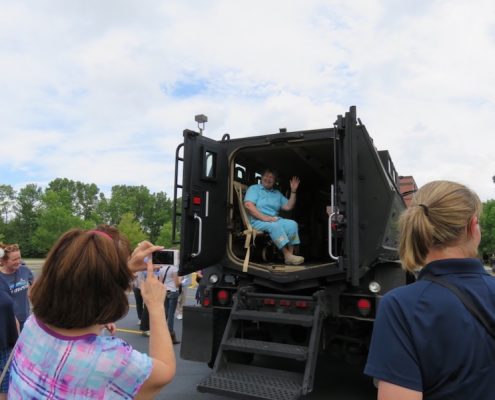
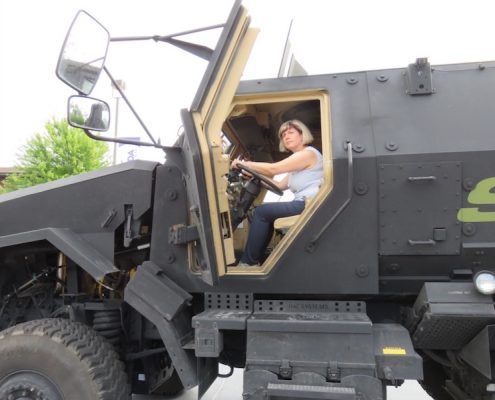
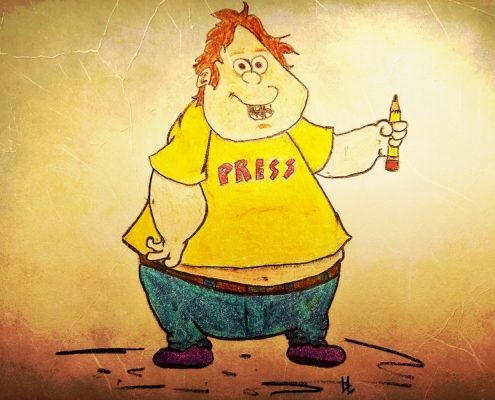 I’ve heard this advice many times, Mr. Is-Probably-Afraid-of-Puppies-and-Rainbows, a real super-duper keyboard warrior, and it’s something you should try at least once … and that’s to write what you know. Hint … this topic wasn’t it.
I’ve heard this advice many times, Mr. Is-Probably-Afraid-of-Puppies-and-Rainbows, a real super-duper keyboard warrior, and it’s something you should try at least once … and that’s to write what you know. Hint … this topic wasn’t it.
